Did You Know?
The first CZC conference was held in Halifax, Nova Scotia in 1994
There have been 15 CZC Conferences hosted by 11 Canadian Cities.
CZC2021 was the first ever virtual CZC conference, attracting over 500 registrants
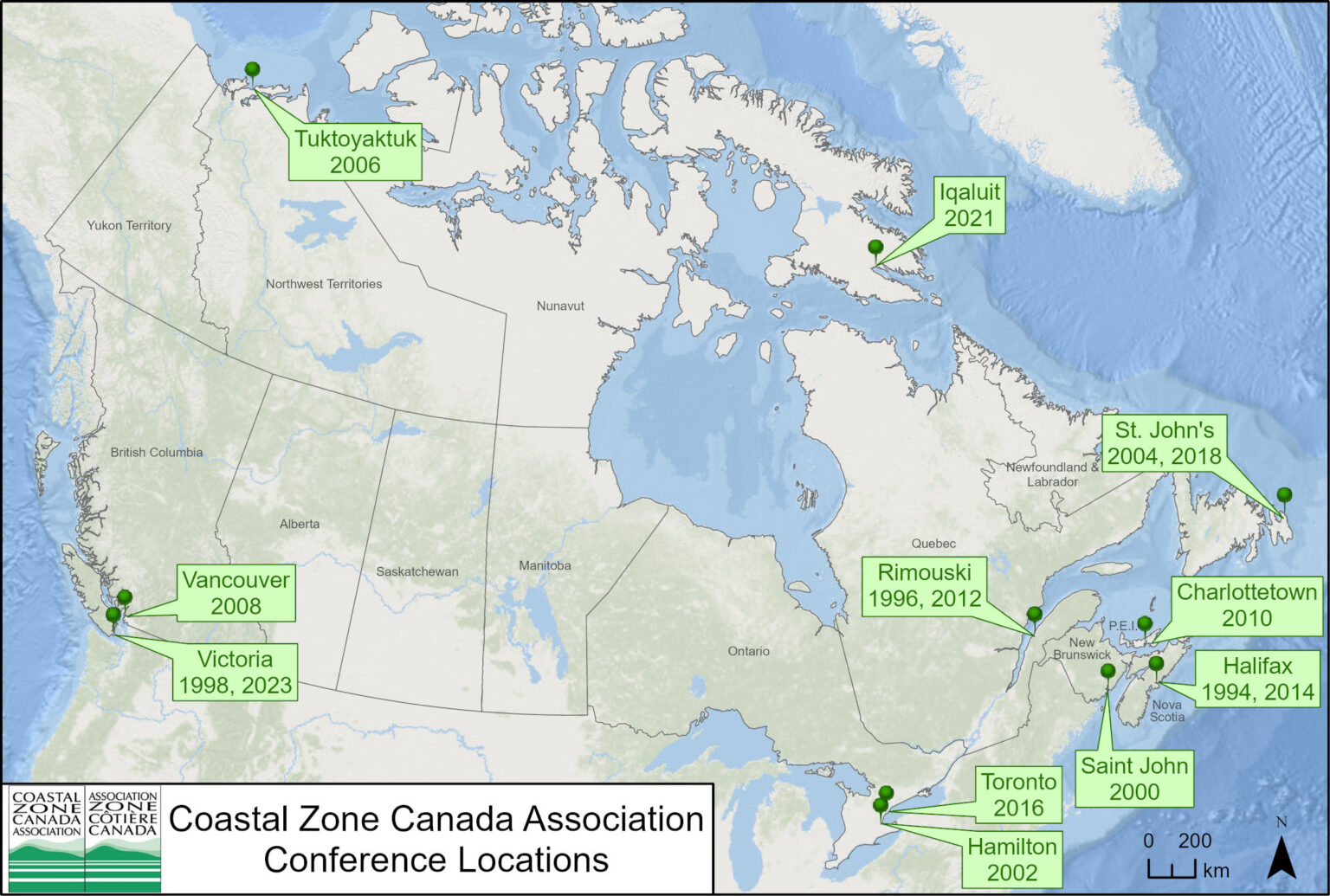
Available Conference Summaries
CZC2023 Victoria
CZC2023, Victoria, June 11-15, 2023 – Connecting Canadians with the Coast
CZC2023 was held on the Salish Sea in Victoria, British Columbia, on the traditional territories of the lək̓ʷəŋən People and whose strong historical relationship continues to this day.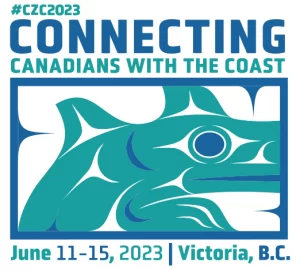
It was our first in-person conference since St John’s and an important opportunity to connect and reconnect on a wide range of coastal zone management topics. Victoria offered a beautiful coastal setting with strong ties to rich maritime and First Nations histories, a stunning waterfront and natural environment for hosting our 15th conference since 1994. Approximately 600 delegates were welcomed to our conference, hosted at the Victoria Conference Center; ideally located downtown and within easy walking distance from hotel accommodations and a wide variety of activities. The VCC was an ideal venue for coastal people of different backgrounds, disciplines, and cultures to come together and share ideas.
Our five day conference began with a scenic cruise of Greater Victoria’s spectacular coastline showcasing many physical and ecological highlights which make Canada’s west coast a special place. That evening the Lək̓ʷəŋən Traditional Dancers shared an opening prayer and welcomed attendees to the territory.
Our technical sessions began on Monday with an opening plenary discussion in which the invited panelists reflected on personal views and perspectives about the importance of the coast and the overall theme of the conference (Connecting Canadians with the Coast). This was intended to motivate delegates to connect with one another to advance scientific and traditional knowledge, engineering, social and policy awareness and action on coastal zone management issues in BC and across Canada.
Our conference emphasized the increasing importance of building a greater connection to the oceans and coastal zone environments as we address hazards associated with a changing climate and increasing development and resource pressures.
On Day 2 of the conference (Tuesday, June 13), we hosted a discussion that highlighted diverse, collaborative approaches in ocean and coastal knowledge, observation and management actions to inform equitable and inclusive climate adaptation solutions to enhance coastal resilience. The speakers emphasized the co-design and co-production of knowledge, implementation and scaling of solutions, and lessons learned.
Finally on Day 4 (Thursday, June 15) during our Closing Plenary, Moronke Harris, an oceanography PhD student in the Juniper Lab at the University of Victoria, moderated an engaging panel for early career professionals in coastal zone management and ocean sciences, featuring winners of the CZCA Conference travel grant. The panel represented a diverse group of voices from across Canada, hailing from the Great Lakes, Arctic, Pacific, and Atlantic regions. The panel shared their experiences and insights to navigate ocean sciences and coastal zone management, including their perspective on how the next generation of ECPs need to work together to manage coastal communities and ecosystems in a changing climate.
The technical program included Oral Presentations, Posters and Special Sessions in the following broad theme areas:
- Coastal and Marine Planning, Conservation and Management to Increase Resilience
- Working Together for Coastal and Marine Stewardship
- Coastal Engineering and Sustainable Development
- Nature-based and Other Solutions for Climate Change Mitigation and Adaptation
- Coastal Processes, Hazards and Risk Management
- Innovation Technology and Research
The conference also included an exhibition hall which was open throughout the conference but a focus during refreshment breaks.
Phil Osborne, Conference Chair
CZC2021 Iqaluit
CZC2021, Iqaluit, June 13-16, 2021
CZC2021, (June 13-16, 2021) Inuit Qaujimajatuqangit: Planning and Preparing for the Future, was a success and we were able to adapt to the ever-changing situation with respect to the COVID-19 pandemic and hold our first virtual conference. While it was extremely disappointing not to travel to Iqaluit for an in-person event, we had great participation from our colleagues and partners in the north and 500 attendees overall.
Notable highlights:
- 1st ever totally online (virtual) conference held in the history of CZC conferences
- 11 Special Sessions
- 1 Poster Session
- 21 Regular Tracks
- 500+ Participants from Canada and across the globe
- Jason Akearok, Executive Director, Nunavut Wildlife Management Board – Recipient of the H.B. Nicholls Award
- Guest speakers from Government, Private Sector and Best Selling Author
- Outstanding entertainment from the Inuksuk Drum Dancers
- Students on Ice C3 Drone Video
- Qulliq Lighting Ceremony
- Youth Perspective – Interview with Jack Allakariallak from Iqaluit, NU
A big thank you to our committee members, sponsors, volunteers, presenters and speakers, and participants for attending this event and we look forward to seeing you in 2023 in Victoria, B.C.
CZC2021 Conference Organizers
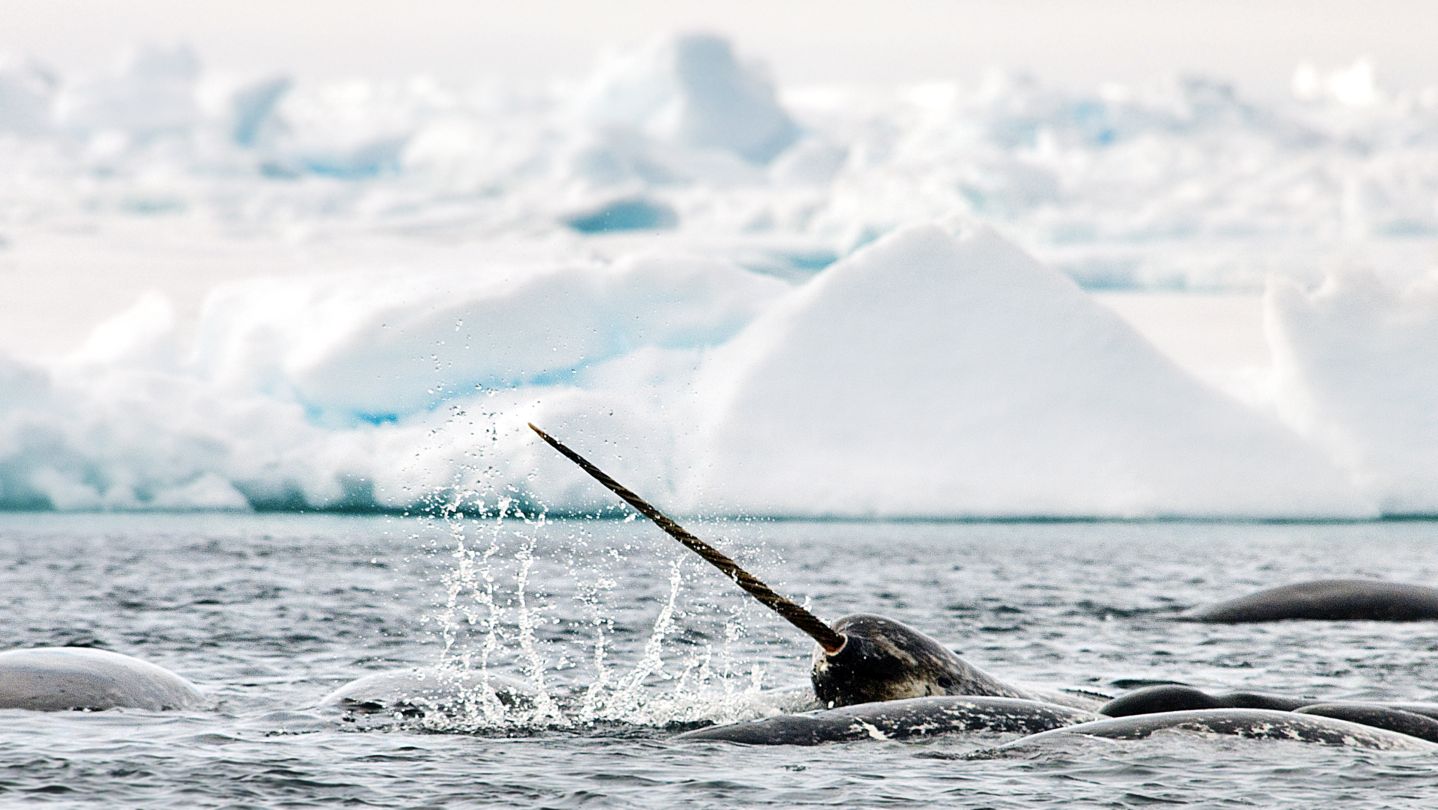
CZC2018 St. John's
CZC2018, St. John's, July 16-19, 2018
The theme for the 2018 Coastal Zone Canada Conference was “Seeking Practical Solutions to Real Issues; Communities Adapting to a Changing World”.
The campus of Memorial University, in St. John’s, NL, hosted the Coastal Zone ’18 conference from July 16th to the 19th. The Future Leaders Forum preceded the conference along with a public presentation by Sheila Watt-Clutier, a nationally renowned cultural and human rights advocate nominated for the Nobel Peace Prize for her efforts in showing the impact of global climate change on human rights, especially in the Arctic.
Each morning, participants heard a keynote address on a daily theme, followed by a panel discussion about the keynote and the theme. Each afternoon there were a series of special sessions, contributed paper sessions and workshops.
On Monday 16th, Kevin Stringer, the Senior Assistant Deputy Minister, Ecosystems and Fisheries Management, DFO, spoke about the Oceans Protection Plan and discussed the change, challenge and opportunities that it faces. On Tuesday 17th, Dr. Ratana Chuenpagdee, of Memorial University and Canada Research Chair in Natural Resource Sustainability and Community Development, introduced us to Examples from the Field on Engagement and Collaboration. Through her address, and the
resulting panel discussion, we learned just how important is the role that communities can play in the field of integrated coastal management, and how, to increase their chance of success, they often require guidance from knowledgeable sources in the early stages of planning. On Wednesday 18th, Kendra MacDonald represented NATI (The Newfoundland and Labrador Association of Technology Industries) discussing the topic of Tools and Technologies. Ms MacDonald’s message was that the technology is rapidly progressing, it is more reliable than before and it is getting more user-friendly. The final session on Thursday morning, hosted by the CZCA, raised the question of what the future of our coasts looks like and what should be the role of the CZCA in Canada. A lot of good discussion ensued, underlining the presence of enthusiastic, dedicated young people focused on issues of coastal management in Canada, who will continue to “carry the torch” for us. The afternoon concurrent sessions provided for lively discussions and debates. Insights from these discussions included:
• We have come a long way in including LEK & TEK from our Indigenous people into our scientific data bases, but we still have a long way to go.
• We continue to experience the ongoing impacts of climate change, and management options include adaptation, policy changes, increased understanding of the consequences, and acknowledgment of the limitations of human intervention.
• Integrated management (multidisciplinary approaches and community engagement) is a must, but many stakeholders require more resources and support to contribute to a coordinated effort
• Understanding natural processes at a system-scale (as opposed to the isolated issue approach) is fundamental in the search of sustainable solutions for climate adaptation, habitat restoration and impact mitigation
• Helpful technology continues to advance, however availability, afford-ability and accessibility are necessary for all stakeholders to be able to take advantage of it
• Many policies cannot keep up with the pace of changing events, and must be fluid and dynamic to be effective
• Participants in the main conference included federal government scientists and managers, provincial government scientists, academics, representatives from NGO’s and the private sector, as well as students, and practitioners with a vested interest in effective management of Canada’s coastal oceans and their associated communities. Approximately 150 registrants attended the conference.
• Key sponsorship by Fisheries and Oceans Canada, Natural Resources Canada and ACOA ensured a top rate conference characterized by leading edge keynote addresses, incisive panel discussions, a series of special sessions and several contributed papers.
Keith Mercer
CZC2018 Conference Chair
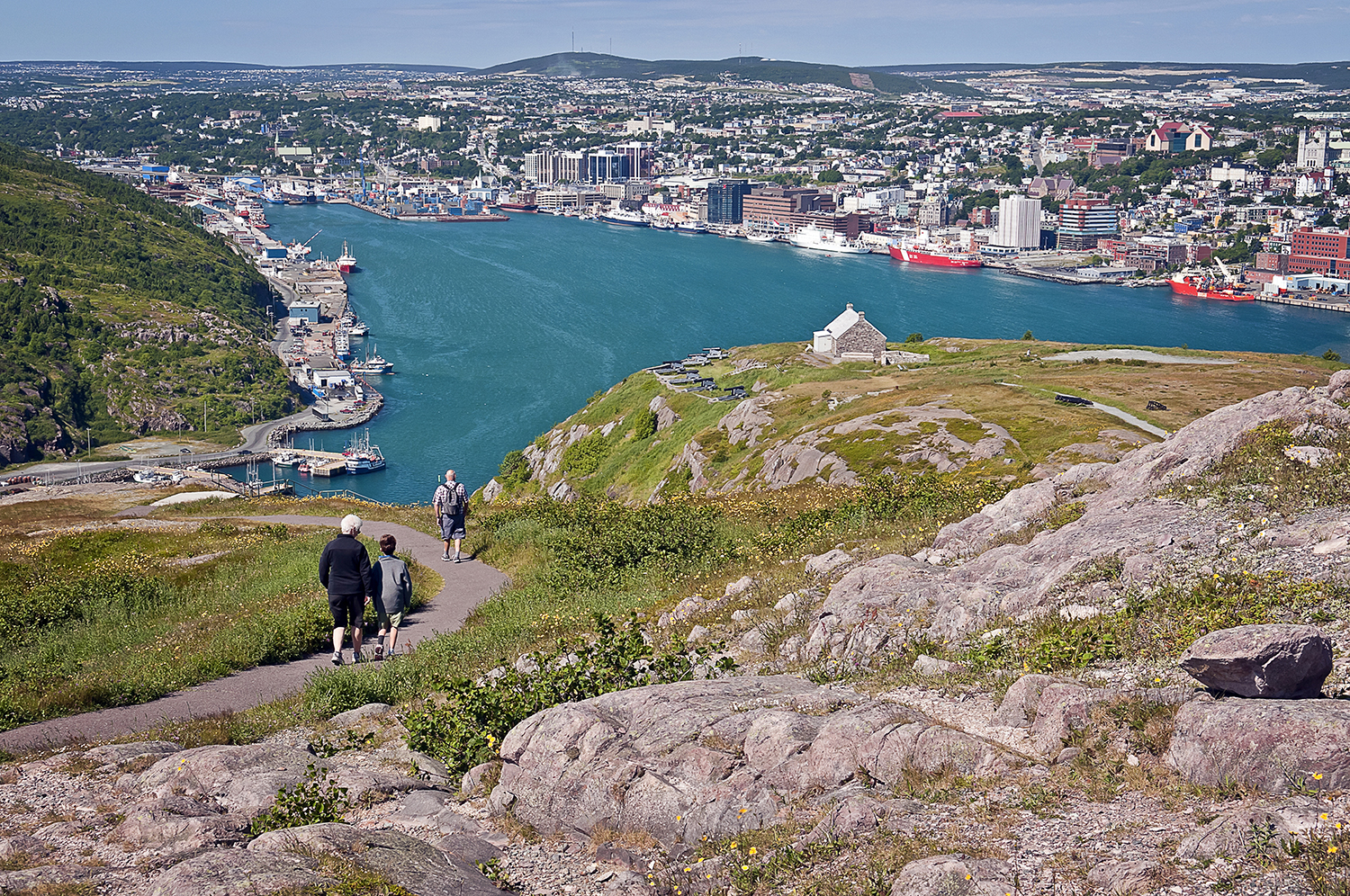
CZC2016 Toronto
CZC2016, Toronto, June 2016
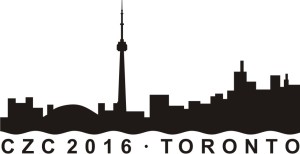 In June 2016, coastal practitioners from around the world, including biologists, ecologist, physical scientists, planners, engineers, legal professionals, policy analysts, government officials and more came to Toronto to present their work and discuss the conference theme, resilience through collaboration.
In June 2016, coastal practitioners from around the world, including biologists, ecologist, physical scientists, planners, engineers, legal professionals, policy analysts, government officials and more came to Toronto to present their work and discuss the conference theme, resilience through collaboration.
A special set of guest speakers gave informative and stimulating keynote presentations on global ocean governance, nature based shorelines, enhancing resilience of coastal cities, and large scale restoration initiatives.
The following activities also took place: a youth-employer forum and opening social; a Natural and Nature Based Features (NNBF) Workshop; and a field trip to sites along the coast of Lake Ontario integrating NNBF.
The full conference brochure can be downloaded using the link below.

Pre-2016
Past Conferences
The Association has been convening biennial Coastal Zone Canada (CZC) conferences on Canada’s four coasts (Atlantic, Pacific, Great Lakes and the Arctic) since 1994 when the first CZC conference was held in Halifax. See below for a full list of our host cities.
- 1994 Halifax, NS
- 1996 Rimouski, QC
- 1998 Victoria, BC
- 2000 Saint John, NB
- 2002 Hamilton, ON
- 2004 St. John’s, NL
- 2006 Tuktoyaktuk, NWT
- 2008 Vancouver, BC
- 2010 Charlottetown, PEI
- 2012 Rimouski, QC
- 2014 Halifax, NS
- 2016 Toronto, ON
- 2018 St. John’s, NL
- 2021 Iqaluit, NU
- 2023 Victoria, BC
